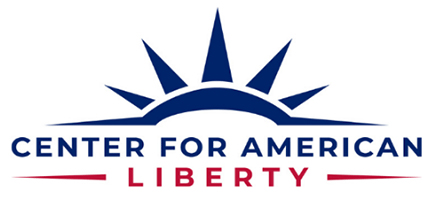
Claims “Restricting Religious Gatherings to 12 Participants Unconstitutionally Violates Right to Equal Protection”
“…the County’s Order violates federal and state law while unashamedly discriminating against houses of worship.”
On Wednesday, June 10, 2020 a formal legal letter was by attorney Harmeet Dhillon, founder of the Center for American Liberty, to members of the Contra Costa County Board of Supervisors, to ensure county health services staff follows through with their commitment to change the requirement to a recommendation that places of worship gather names and contact information of those who attend services and provide it to the county upon request. (See related articles, here, here and here). In addition, the letter points out that the county’s health order limiting indoor services to 12 people also violates the Constitution. 2020.06.10_HDhillon CAL Letter to Contra Costa County
June 10, 2020
Contra Costa County Board of Supervisors
651 Pine Street
Martinez, CA 94553
Re: Unconstitutional Contra Costa Health Services Order No. HO-COVID19-17, Specifically Regarding “Additional Businesses” (section 3 of Appendix C-1, Updated June 5, 2020)
Dear Board of Supervisors:
We write today, on behalf of clients in Contra Costa County, to demand the immediate rescission of Contra Costa Health Services Order NO. HO-COVID19-17 (the “Order”). The Order is concerning for two reasons: (1) Its requirement that houses of worship—and only houses of worship—keep and upon request disclose “a record of attendance” to Contra Costa Health Services violates both state and federally protected rights of associational privacy; (2) Restricting religious gatherings to no more than 12 participants violates First and Fourteenth Amendment protection. And while we appreciate the County’s recent announcement that it plans to revise its requirement that houses of worship keep and disclose attendance lists, until such plans manifest, we reiterate our objection over its current text.
- Restricting Religious Gatherings to 12 Participants Unconstitutionally Violates First Amendment Rights
The First Amendment to the U.S. Constitution prohibits government actors from enforcing any “law respecting an establishment of religion, or prohibiting the free exercise thereof.” U. S. Const. amend. I; see also Cantwell v. Connecticut, 310 U.S. 296, 303 (1940) (applying the First Amendment to the States through the Fourteenth Amendment). Under strict scrutiny, the government cannot burden religious activity unless it first establishes (1) a compelling interest for imposing such burdens, and (2) that the burdens are the “least restrictive means” necessary to further that compelling interest. Federal courts routinely enjoin the enforcement of laws and policies under this standard. See e.g., Church of the Lukumi Babalu Aye, Inc. v. City of Hialeah 508 U.S. 520, 524 (1993).
The County’s Order severely burdens religious expression. The Order’s restriction on indoor religious services—limiting the number of participants to 12 persons or 25% of the building’s capacity, whichever is less—does not survive exacting scrutiny in that it is not the least restrictive means to accomplish the County’s interest in public health. Simply put, there are better ways for the County to accomplish its interest in public health that do not burden religious expression as much. For example, restricting participation on a percentage basis only—with respect to facility seating capacity—is a better solution. Twelve people in a sanctuary that holds one thousand looks very different from twelve people in a sanctuary that holds one hundred people.
In other words, percentage-based restrictions accommodate larger houses of worship while satisfying the County’s interest in public health and social distancing.
- Restricting Religious Gatherings to 12 Participants Unconstitutionally Violates Right to Equal Protection
The Fourteenth Amendment of the Constitution provides that “[n]o State shall . . . deny to any person within its jurisdiction the equal protection of the laws.” U.S. Const. amend. XIV, § 1.
Equal protection requires the state to govern impartially—not draw arbitrary distinctions between
individuals based solely on differences that are irrelevant to a legitimate governmental objection. City of Cleburne, Tex. v. Cleburne Living Ctr., 473 U.S. 432, 446 (1985).
Here, the County’s 12-person limit on religious gatherings is nothing if not arbitrary. This is more restrictive than statewide health guidelines, according to the California Department of Health for places of worship, which currently limits attendance to 25% of building capacity or a maximum of 100 attendees, whichever is less; it is unclear where Contra Costa County’s “12 person” idea originates.
Additionally, no other establishment in Contra Costa County is subject to these more restrictive and draconian requirements. Costco, laundromats, marijuana dispensaries, and countless other purely secular entities are not burdened by this arbitrary, 12-person limitation.
On April 14, 2020, the United States Attorney General, William Barr, issued a statement addressing the disparate treatment being afforded to houses of worship.
As we explain in the Statement of Interest, where a state has not acted evenhandedly, it must have a compelling reason to impose restrictions on places of worship and must ensure that those restrictions are narrowly tailored to advance its compelling interest. While we believe that during this period there is a sufficient basis for the social distancing rules that have been put in place, the scope and justification of restrictions beyond that will have to be assessed based on the circumstances as they evolve.
Religion and religious worship continue to be central to the lives of millions of Americans. This is true more so than ever during this difficult time. The pandemic has changed the ways Americans live their lives. Religious communities have rallied to the critical need to protect the community from the spread of this disease by making services available online and in ways that otherwise comply with social distancing guidelines.
The County may not treat houses of worship as second class entities; at a minimum, it must treat them equitably with respect to secular counterpart. Contra Costa Health Services Order NO. HO-COVID19-17 does the opposite—it targets houses of worship with more burdensome restrictions.
III. The Order Infringes Upon Constitutionally Protected Right to Privacy Under State Law
The right to privacy is an inalienable right under California law.3 This privacy interest irrefutably extends to participation in religious gatherings.
In Church of Hakeem, Inc. v. Superior Court, Alameda County, 110 Cal. App. 3d 384 (Ct. App. 1980), the court expressly declined to mandate disclosure of member names and addresses, even after allegations of criminal activity or wrongdoing by the church. In City of Carmel-by-the-Sea v. Young, 2 Cal. 3d 259 (Ct. App. 1970), the court affirmed a list of freedoms afforded constitutional protections, such as the freedom of association and privacy in one’s associations, encompassing privacy of the membership lists of a constitutionally valid organization. In Pacific Union Club v. Superior Court, 232 Cal. App 3d 60 (Ct. App. 1991), the court provided a robust analysis of associational rights and ultimately upheld a private club’s right not to disclose member lists.
Applied here, Contra Costa County’s Order requiring houses of worship to create and preserve the names and contact information of those in attendance at a worship service or ceremony, and then disclose such information “immediately upon request” unconstitutionally violates privacy rights while chilling religious expression. Whether gathering for political, social, or religious reasons, the right of association is sacrosanct. Unfortunately, the County’s Order deprives Californians their right to pray, worship, repent, and seek spiritual guidance privately. Rather, the Order subjects their most intimate religious activities to potential publication.
3 “All people are by nature free and independent and have inalienable rights. Among these are enjoying and defending life and liberty, acquiring, possessing, and protecting property, and pursuing and obtaining safety, happiness, and privacy.” Cal. Const. Art. 1 § 1
- The Order Violates Right to Privacy Protected by Federal Law
The “Court has recognized the vital relationship between freedom to associate and privacy in one’s associations.” Nat’l Ass’n for Advancement of Colored People v. State of Ala. Ex rel. Patterson, 357 U.S. 449, 462 (1958). Citing American Communications Ass’n, C.I.O., v Douds, 339 U.S. 382, 402 (1950), the Court explained,
‘A requirement that adherents of particular religious faiths or political parties wear identifying arm-bands, for example, is obviously of this nature.’ Compelled disclosure of membership in an organization engaged in advocacy of particular beliefs is of the same order. Inviolability of privacy in group association may in many circumstances be indispensable to preservation of freedom of association, particular where a group espouses dissident beliefs.
Here, Contra Costa County’s Order tramples Californians’ right to privacy and in doing so, violates the Due Process Clause. Similar to the state of Alabama in NAACP v. Alabama, Contra County is requiring houses of worship to disclose the identities of congregants gathering to worship. And similar to the state of Alabama, this mandatory disclosure of religious expression “curtails the freedom to associate,” “denying “the ‘liberty’ assured by the Due Process Clause of the Fourteenth Amendment,” and is “subject to the closest scrutiny.” Id. at 460-61.
- Attendance Recordation Requirement Violates Equal Protection Protected by Federal Law.
By the Order’s express terms, the Order discriminates against places of worship by requiring places of worship to create and maintain attendee lists, yet the Order places no other such burdens on any other non-religious establishment whatsoever. As the United States Supreme Court has noted, “a law burdening religious practice that is not neutral or not of general application must undergo the most rigorous of scrutiny.” Church of the Lukumi Babalu Aye, Inc. v. Hialeah, 508 U.S. 520, 546 (1993). Further, “A law is not generally applicable if its prohibitions substantially under include non-religiously motivated conduct that might endanger the same governmental interest that the law is designed to protect.” Stormans, Inc. v. Wiesman, 794 F.3d 1064, 1079 (9th Cir. 2015) (citing Lukumi, 508 U.S. at 542–46). So, “In other words, if a law pursues the government’s interest ‘only against conduct motivated by religious belief,’ but fails to include in its prohibitions substantial, comparable secular conduct that would similarly threaten the government’s interest, then the law is not generally applicable.” Id.
The County fails this standard. Houses of worship are uniquely burdened by this public disclosure requirement. And again, no other entity appears to be subjected to this standard.
In conclusion, we believe the County’s Order violates federal and state law while unashamedly discriminating against houses of worship. For these reasons, the Center for American Liberty respectfully requests that Contra Costa Health Services Order NO. HO-COVID19-17, requiring houses of worship to record and disclosure attendance at religious services, be either rescinded or amended to cure its constitutional defects. We look forward to hearing your response.
Regards,
Harmeet K. Dhillon
cc: John Gioia, Candace Anderson, Diane Burgis, Karen Mitchoff, Federal D. Glover

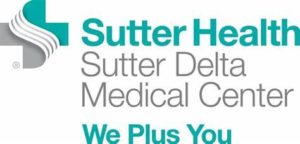 ANTIOCH, CALIF. — California is slowly reopening, but like so many unknowns with COVID-19, it’s unclear how long the return to routine will last.
ANTIOCH, CALIF. — California is slowly reopening, but like so many unknowns with COVID-19, it’s unclear how long the return to routine will last.










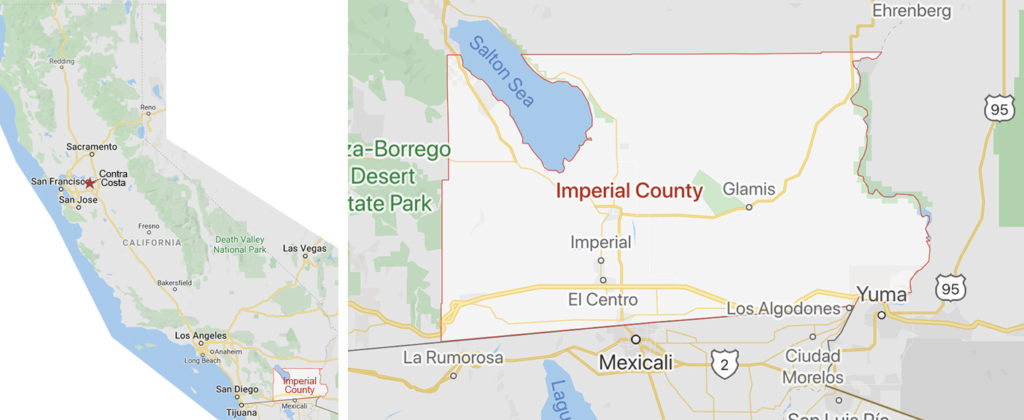
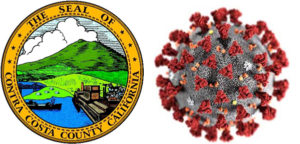 In response to some concerns by county residents and questions to county Supervisor Candace Andersen and health services spokespeople, it was revealed this week that Contra Costa is accepting patients from hospitals as far away as Imperial County along the border with Mexico. That’s because our county has mutual aid agreements with that and other counties in the state.
In response to some concerns by county residents and questions to county Supervisor Candace Andersen and health services spokespeople, it was revealed this week that Contra Costa is accepting patients from hospitals as far away as Imperial County along the border with Mexico. That’s because our county has mutual aid agreements with that and other counties in the state.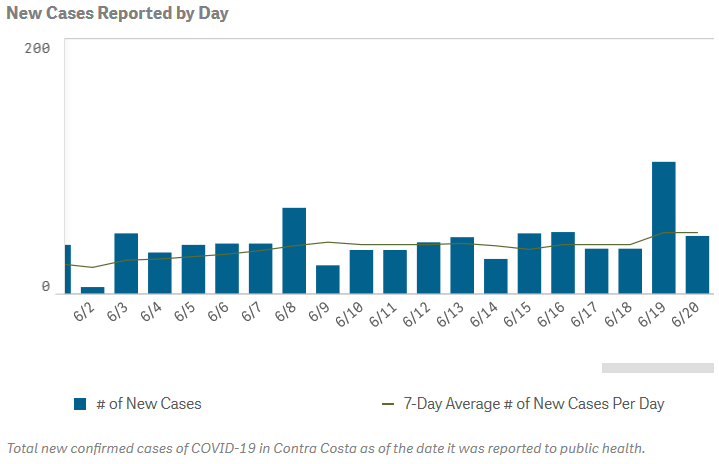
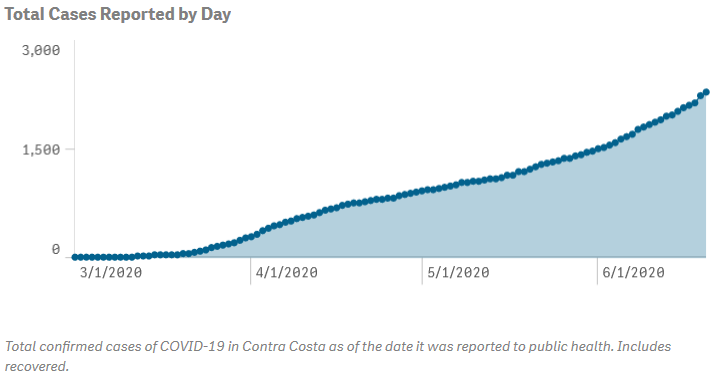
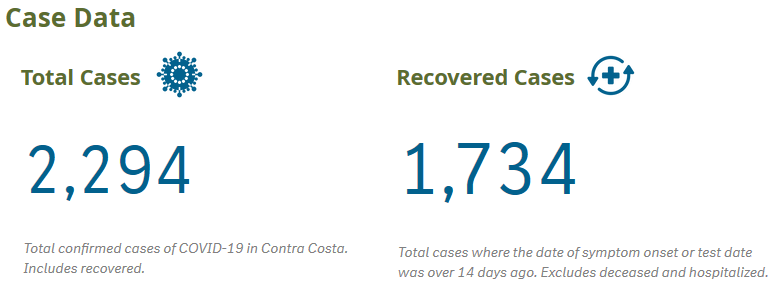
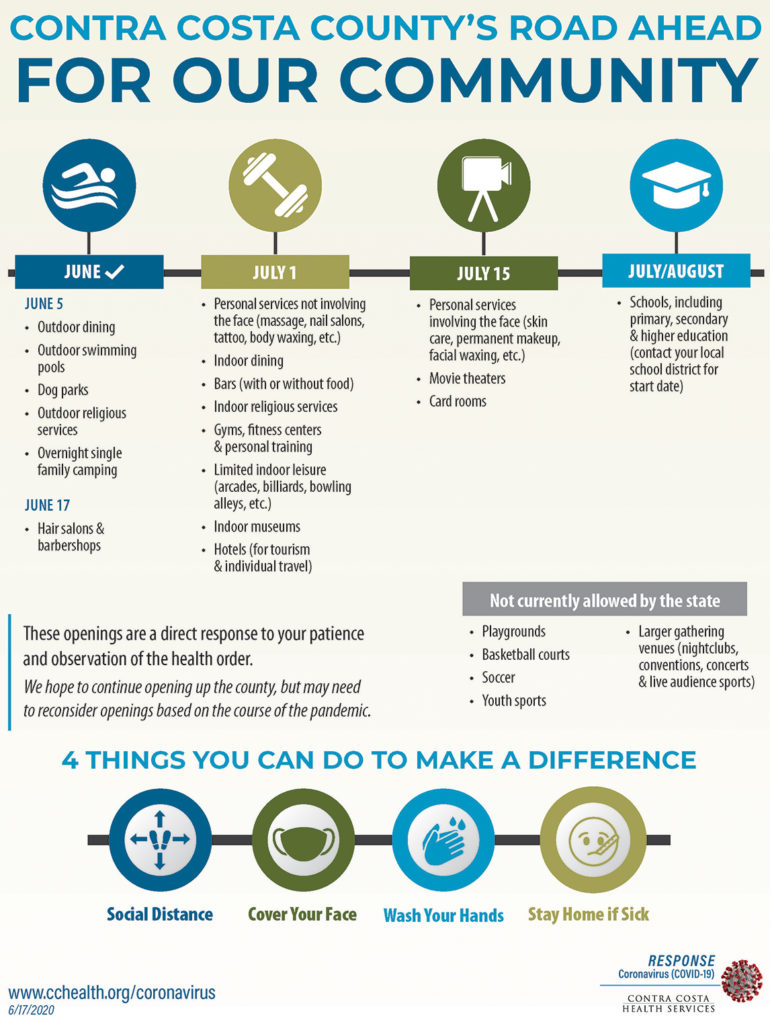

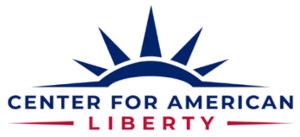 Following is the statement from the
Following is the statement from the 












